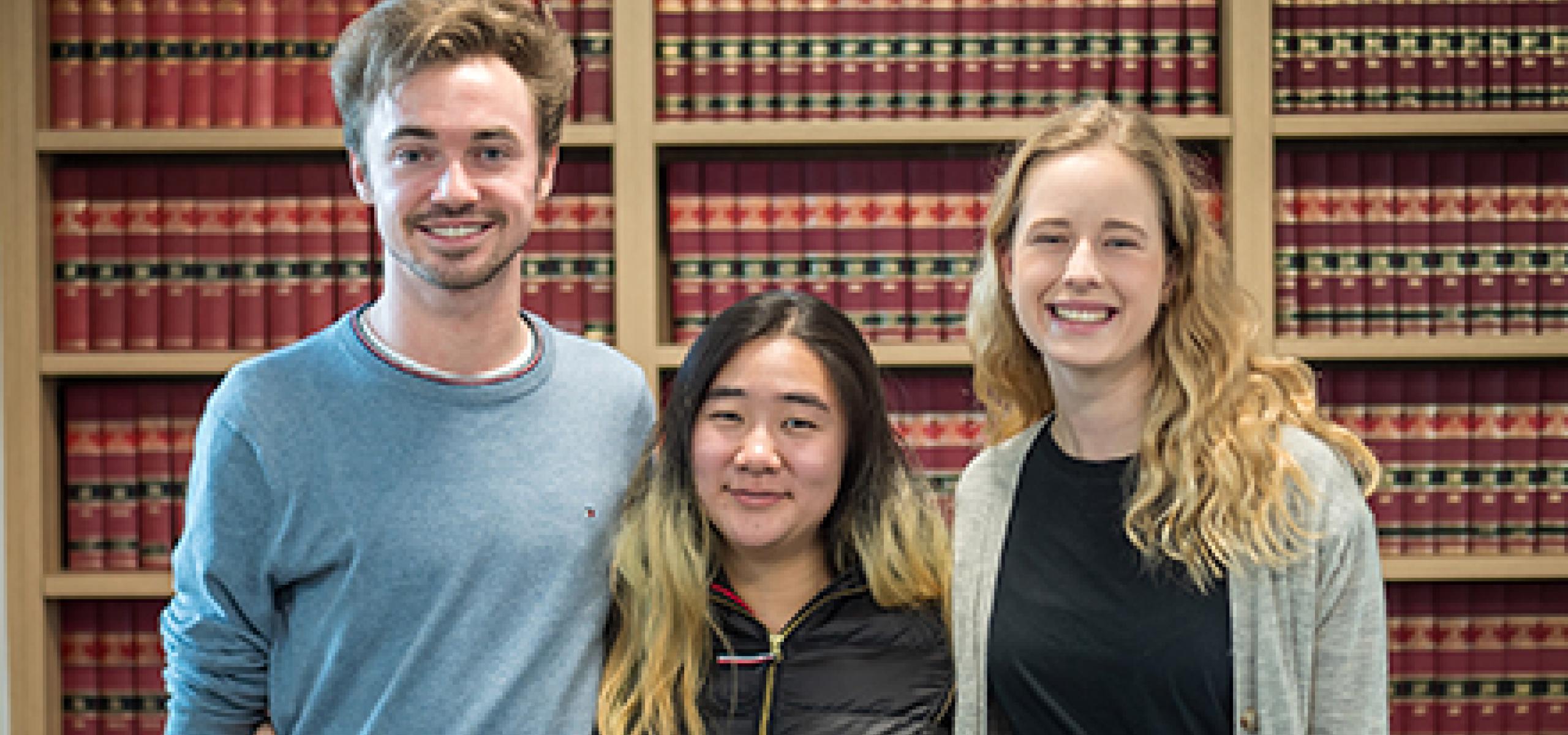
Students from the championship-winning ANU (l to r) Nick Bradman, Grace Lee and Ella Sheppard.
The rapidly changing nature of technology makes computational law an area of law where there are constantly new policy questions.
By Aidan Hookey, ANU College of Law Student Ambassador
A team from The Australian National University (ANU) College of Law has won the Herbert Smith Freehills (HSF) International Computational Law e-Moot, sealing back-to-back championships in the competition for the College.
The competition brought together 16 teams from nearly a dozen universities around the world including Australia, Germany, India, Hong Kong, Singapore and the United Kingdom.
The winning team of Nick Bradman, Ella Sheppard and Grace Lee edged out a team from the Singapore Management University (SMU) Yong Pung How School of Law in a closely contested grand final on 6 May 2021.
Co-counsel @TaranMolloy is getting some practice in before our Grand Final against ANU in the HSF International Computational Law Moot! @HSFlegal#emootcompetitionpic.twitter.com/uGquiT7B3c
— Emily Partridge (@emilylpartridge) March 11, 2020
Their victory builds on the success of the 2020 ANU team, comprising Andrew Ray (BSc/LLB (Hons) ’20) and Javier Cross (BEc/LLB (Hons) ’21), who won the competition in its inaugural year. Andrew also served as coach of this year’s championship-winning team.
The HSF International Computational Law e-Moot focuses on the growing relationship between law and computer science. This includes ethical and policy questions related to topics such as data privacy, artificial intelligence (AI), social media, and cryptocurrencies.
The 2021 grand final centred on a joint venture between parties in relation to an e-advertising deal on a Facebook page, with the ANU team representing the appellants. Questions included whether the AI behind the page had sufficient legal personhood and whether the page could be subject to legal action.
Nick Bradman, a penultimate Bachelor of Laws (Hons)/Politics, Philosophy and Economics student, noted there is “something exciting about competing against teams from all over the world”.
“Our grand final felt like a global operation, with us conducting submissions from Canberra against a team from Singapore with judges from Australia, Singapore and Germany,” he said.
ANU was also proudly represented by two other teams, which placed fifth and sixth in the competition’s general rounds.
Important skills for future lawyers
Computational law is a vital field of legal knowledge for emerging lawyers, Nick noted.
“It is a common misconception that lawyers’ imminent ‘replacement’ by new technologies (such as AI) is on the horizon, but future lawyers will certainly require a greater level of technological literacy,” he said.
“In some ways, the law has not kept pace with the proliferation of data generation and the use of technology over recent years, and this competition is an exception in recognising the new knowledge and skills that lawyers will need going forward.”
Monambi Wiya, a member of another ANU team in the competition, also emphasised the importance of law evolving to meet the needs of modern society.
“The rapidly changing nature of technology makes computational law an area of law where there are constantly new policy questions. The HSF Computational Law e-Moot, at least compared with other more ‘black-letter’ law moots, allowed us to make a number of interesting policy-based arguments,”
E-mooting offers 'accessible' alternative
The HSF International Computational Law e-Moot is one of the first competition moots to be entirely based on video-conferencing platform Zoom.
As many people gradually return to in-person work and study, Monambi is confident that e-mooting is here to stay.
“Traditional international competitions can be expensive affairs once flights, accommodation and other travel costs are factored in. The beauty of the e-mooting competition was how accessible it made the valuable experience of pleading with teams from other countries,” said Monambi.
A self-described “fairly confident” public speaker, Monambi noted the prospect of mooting in-person is “far more daunting” than via Zoom, a familiar remote learning environment for many students.
“Taking part in this competition was a great initial mooting experience and it made me wish I had got involved in mooting earlier in my degree,” he said.
Fellow ANU team member Callum Davis agrees, saying it was “a privilege to be able to gain insights from judges” across jurisdictions including Singapore and New York.
Despite some “unique challenges”, such as internet connectivity issues and awkward silences, e-mooting places further emphasis on mooting skills such as using “eye contact and hand gestures to your advantage”, says Ella.
However, like with traditional mooting, the teams points out that preparation is key.
“In the end, I think we did about 15 practice moots,” Ella said.
Undertaking “a lot of research into different areas of law that we hadn’t previously looked at, particularly when we were looking at case law from other jurisdictions to incorporate into our submissions” was vital, according to Callum.
The winning ANU team has been invited to attend HSF's DigiCon Tech Law conference, a training program offered by the firm to its international graduates.
The ANU e-mooting teams wish to thank Andrew Ray for coaching the team and imparting his experience, as well practice judge’s Dr Dilan Thampapillai (ANU College of Law), Javier Cross (ANU Law Student), Lauren Skinner, Rose Estanislao and Will Randles (ANU alumni), Soja Campbell, Major Zhang and Lachlan Peake (UNSW alumni), and Giacomo Rotolo Ross (USyd Alumni). Additionally, a special thanks to Associate Professor Phillipa Ryan (ANU College of Law) for her work running the competition and Herbert Smith Freehills for sponsoring the moot and providing international judges.
Interested in mooting at ANU? Learn more about our competitions here.